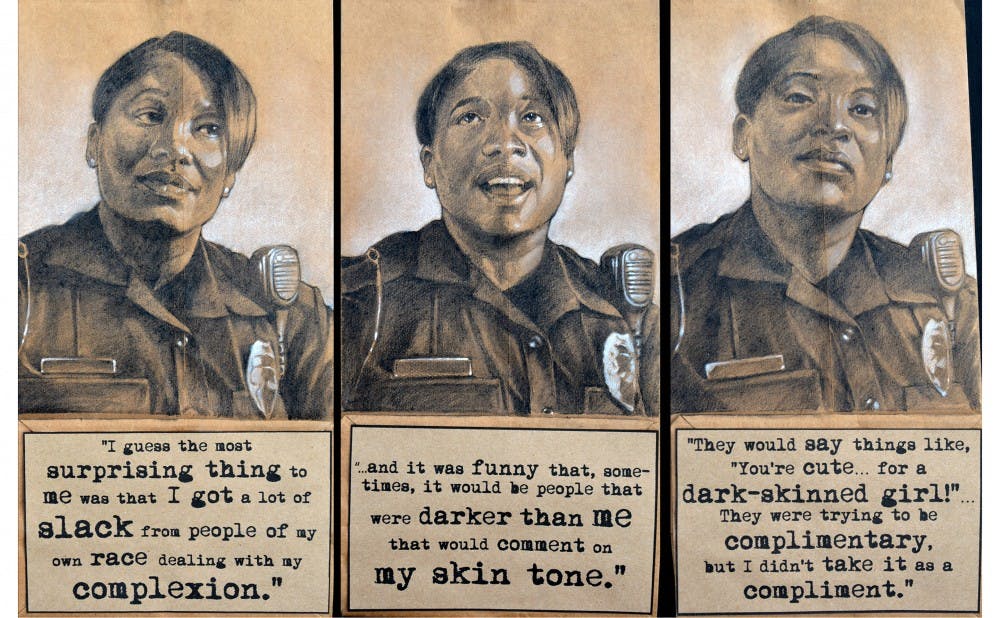“Have you ever heard of the paper bag test?”
That is the way Steven Cozart begins his interviews for “Pass/Fail,” a series of illustrations that was awarded the 2016 Dorothea Lange-Paul Taylor Prize by the Center for Documentary Studies. In conversations with family, colleagues and friends, Cozart explores the problem of colorism within the African-American community, crystallized in the form of the “brown paper bag test.” Afterwards, he documents their responses: not on film or canvas, but on paper bags.
Historically used to enforce discrimination based on skin tone, the test is an example of how the African-American community can be divided against itself. The shade of a brown paper bag becomes a line that separates people, defining who they are and where they belong. Even if Cozart’s interviewees have not heard of the test, they all understand its spirit.
“[Nowadays] nobody literally holds a paper bag next to a person, but the notion of looking at skin tone to decide whether a person is accepted in a social group, that part never went away,” Cozart said.
It is easy to assume that people of lighter skin would be treated better, but that is not always true. What is shown in “Pass/Fail” is that trends change, and people affected by colorism have vastly different stories—interviewees range from high school students to police officers—that go to show how the line is, in the end, arbitrary.
“One thing that surprised me and made me rethink is that no one came out the winner,” Cozart said. “It is not more preferable to be light-skinned or dark-skinned: some said their loyalty to their group was questioned because they’re [light], some said their loyalty was questioned because they’re dark.”
For Cozart, this form of subtle discrimination hits close to home. The project started as a conversation between him and his mother, who lived through the Jim Crow era.
She has a lighter skin tone because her grandmother was Native American. Her portrait in “Pass/Fail” is accompanied by a quote that reads: “My Momma got accused of cutting out on my Daddy because he was extremely dark, she was brown, and I came out with this complexion. People thought that (she cheated), until they met my Grandmother.”
This personal focus makes “Pass/Fail” feel small-scale and intimate, in a way that distinguishes it from other documentary projects. In awarding this year’s Lange-Taylor Prize, Duke’s Center for Documentary Studies sought
to challenge conventions of what documentary work looks like, and how and why it is made.
“Stories about communities of color have historically been told by outsiders,” wrote Alexa Dilworth, publishing and awards director of CDS, in an email. “Cozart’s commitment to documenting his own community—beginning with himself and his family, and working outward—and to presenting the work first and foremost for this community as a way to encourage introspective conversation is incredibly valuable.”
The use of paper bags as a medium also goes against conventional wisdom on what counts as documentary work. While the Prize was created in 1990 to encourage collaboration between writers and photographers, it was relaunched in 2013 with a more expansive idea of what qualifies as words and images, which now includes hand-drawn illustrations and graphic novels. Before Cozart, the Prize had exclusively been awarded for photography projects.
Started in 2013, “Pass/Fail” is an ongoing project that has no planned ending. This is fitting given how the dynamics of colorism is increasingly relevant, often taking center stage in national politics. Earlier this year, Ben Carson made controversial comments on how President Obama is “not black enough,” which Cozart dismissed as preposterous and short-sighted.
But Cozart’s ultimate goal is dialogue and not antagonism. “I try to be very careful not to ‘fight’ [colorism], because the one thing I don’t want to start is an argument. It is very easy to make a villain, but sometimes people think the way they do, because they do what they know,” he said.
In his upcoming interviews, Cozart plans to explore subjects such as hairstyles for African-American women and the idea of sports for African-American men. Both topics look innocuous on the surface, but are fraught with tension underneath. With the help of repurposed paper bags, perhaps everyone can talk this out.
“When you start that dialogue, then you begin to think maybe you should approach things differently,” Cozart said. “Or maybe you find something out about yourself.”
Get The Chronicle straight to your inbox
Sign up for our weekly newsletter. Cancel at any time.

